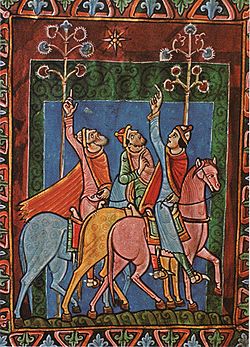- Matthew 2:9
-
Matthew 2:9 is the ninth verse of the second chapter of the Gospel of Matthew in the New Testament. King Herod has dispatched the magi to Bethlehem to find the infant Jesus. In this verse they follow the Star of Bethlehem to find the infant.
In the King James Version of the Bible the text reads:
- When they had heard the king, they departed; and, lo, the
- star, which they saw in the east, went before them, till
- it came and stood over where the young child was.
The World English Bible translates the passage as:
- They, having heard the king, went their way; and behold,
- the star, which they saw in the east, went before them,
- until it came and stood over where the young child was.
For a collection of other versions see BibRef Matthew 2:9
Unlike the previous mention of the Star of Bethlehem this verse clearly indicates that it guided the magi to their destination. In combination with the next verse it seems to be clear that the star pointed out the specific house Jesus was in, or perhaps the entire village. How it did this is unspecified in the text, and artists have portrayed a wide array of means.
The phrase "went before" can mean either that the star was moving throughout their journey or that it remained stationary and served only as a fixed guide. However the phrase "came and stood" unambiguously means that it ceased moving and came to a rest at this point. Hill comments that the undeniably miraculous behaviour of the star in this verse defies all the various attempts to rationalize the star it as a natural nova or conjunction. This might be a reference to the pillar of cloud that guide the Israelites through the wilderness.[1] Fortnas notes that the astronomical theory of the time thought of the stars a points of light moving along a fixed heavenly dome. This made it far easier to imagine a star stopping its motion. [2]
It is unclear exactly how long after Jesus' birth the magi arrived. Traditionally they were seen to arrive at most a few days after the birth of Jesus as the Gospel of Luke has Jesus leaving for Jerusalem by the time he was forty days old from whence he went to Nazareth. This left a fairly brief window of time for the magi to visit him in Jerusalem, especially considering they needed time to travel from the east via Jerusalem. In this verse the author of Matthew refers to Jesus as a child rather than an infant, perhaps indicating that he was older. Today most scholars feel that Matthew probably meant that Jesus was several months old at the time the magi visited.[3]
References
- ^ France, R.T. The Gospel According to Matthew: an Introduction and Commentary. Leicester: Inter-Varsity, 1985. pg. 73
- ^ Fortna, Robert. The Gospel of Matthew - Scholars Bible Polebridge Press, 2005 pg. 36
- ^ Brown, Raymond E. The Birth of the Messiah: A Commentary on the Infancy Narratives in Matthew and Luke. London: G. Chapman, 1977.
- Albright, W.F. and C.S. Mann. "Matthew." The Anchor Bible Series. New York: Doubleday & Company, 1971.
- Hill, David. The Gospel of Matthew. Grand Rapids: Eerdmans, 1981
Gospel of Matthew Preceded by:
Matthew 2:8Chapter 2 Followed by:
Matthew 2:10Categories:- Gospel of Matthew verses
- Biblical Magi
Wikimedia Foundation. 2010.

